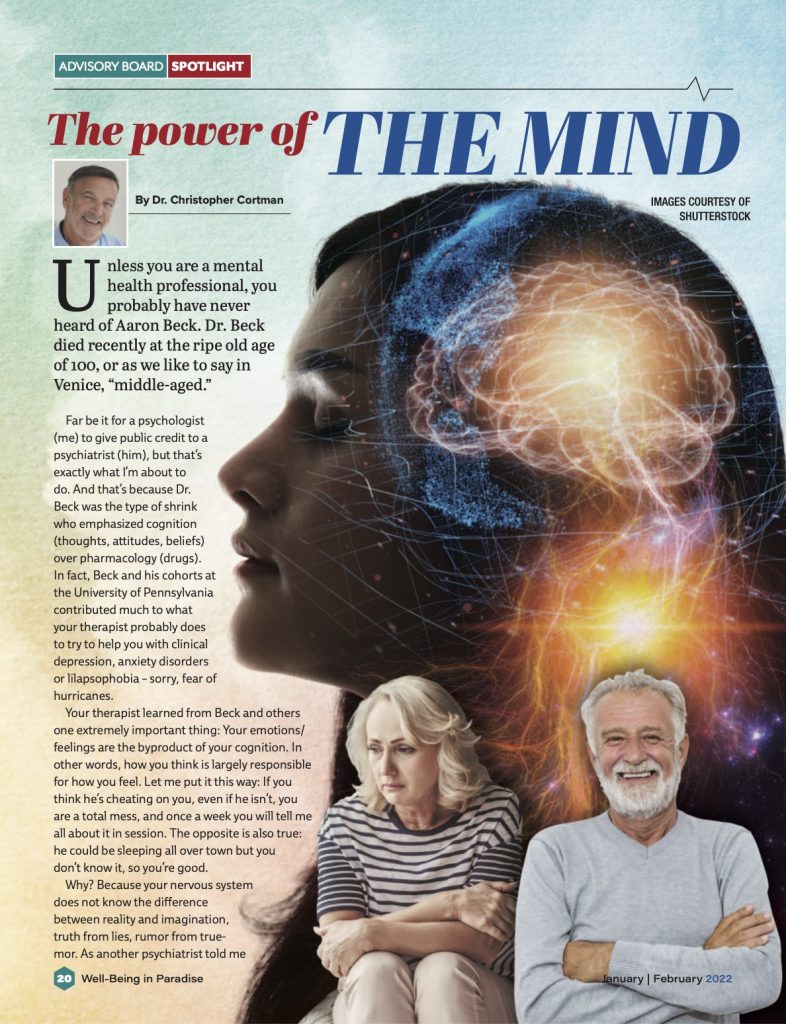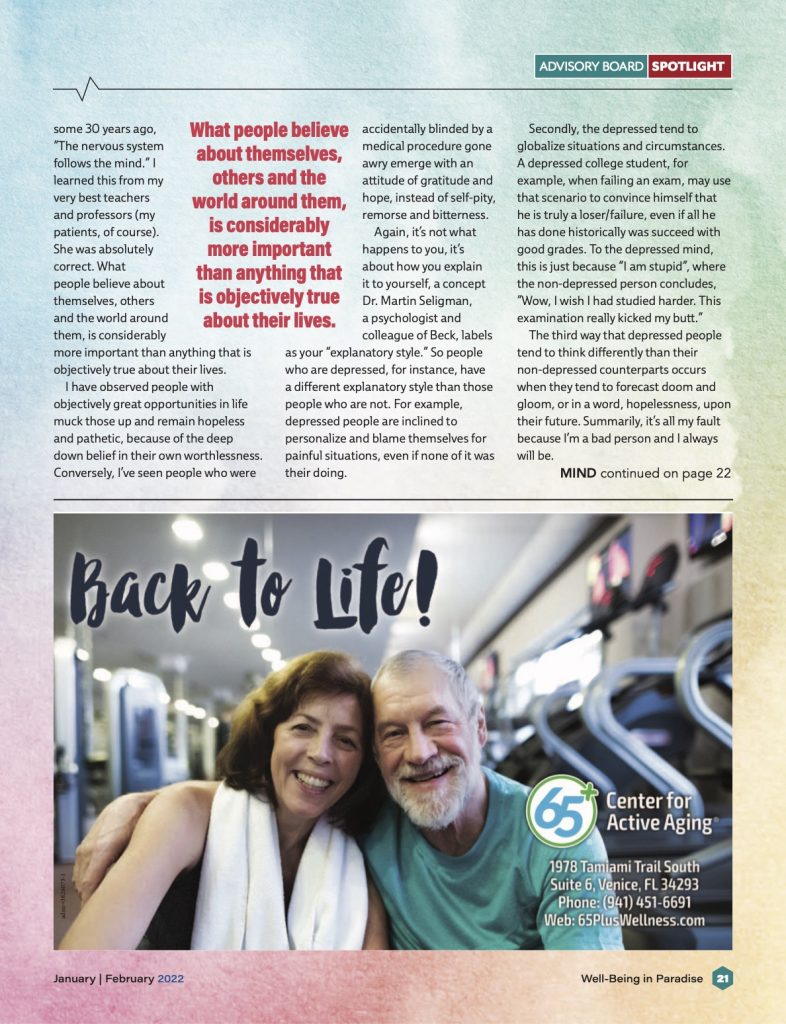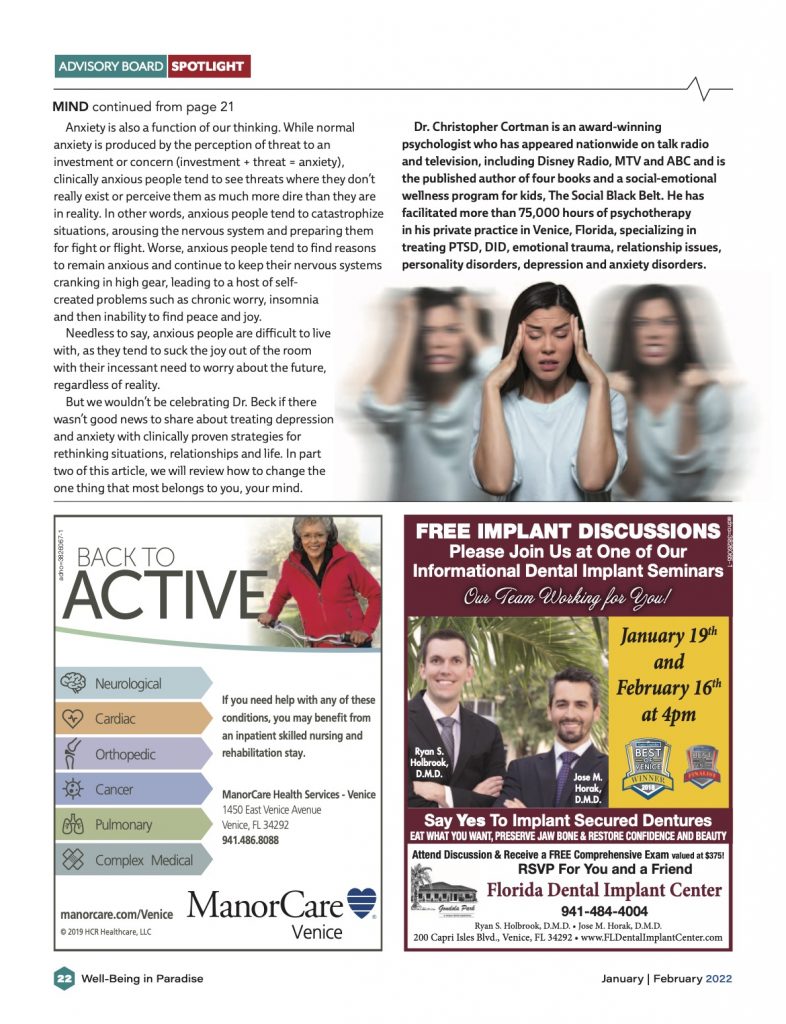Article written for the Venice Gondolier’s Well Being in Paradise Magazine | January/February 2022
Unless you are a mental health professional, you probably have never heard of Aaron Beck. Dr. Beck died last month at the ripe old age of 100, or as we like to say in Venice, “middle-age“. Far be it for a psychologist (me) to give public credit to a psychiatrist (him), but that’s exactly what I’m about to do. And that’s because Dr. Beck was the type of shrink who emphasized cognition (thoughts, attitudes, beliefs) over pharmacology (drug). In fact, Beck and his cohorts at the University of Pennsylvania contributed much to what your therapist probably does to try to help you with clinical depression, anxiety disorders or lilapsophobia- sorry, fear of hurricanes.
Your therapist learned from Beck and others one extremely important thing: your emotions/feelings are the byproduct of your cognition. In other words, how you think is largely responsible for how you feel. Let me put it this way, if you think he’s cheating on you, even if he isn’t, you are a total mess, and once a week you will tell me all about it in session. The opposite is also true: he could be sleeping all over town but you don’t know it, so you’re good!!
Why? Because your nervous system does not know the difference between reality and imagination, truth from lies, rumor from true-mor. As another psychiatrist told me some 30 years ago, “the nervous system follows the mind”. “ as I learned from my very best teachers and professors (my patients, of course), she was absolutely correct. What people believe about themselves, others and the world around them is considerably more important than anything that is objectively true about their lives. I have observed people with objectively great opportunities in life muck those up and remain hopeless and pathetic, because of the deep down belief about their own worthlessness. Conversely, I’ve seen people who were accidentally blinded by a medical procedure gone awry emerge with an attitude of gratitude and hope, instead of self-pity, remorse and bitterness.
Again, it’s not what happens to you, it’s about how you explain it to yourself, a concept dr. Martin Seligman, a psychologist and colleague of Beck’s, labels as your “explanatory style“. So people who are depressed, for instance, have a different explanatory style than those people who are not. For example, depressed people are inclined to personalize and blame themselves for painful situations, even if none of it was their doing. Secondly, the depressed tend to globalize situations and circumstances. A depressed college student, for example, when failing an exam, may use that scenario to convince himself that he is truly a loser/failure, even if all he has done historically was succeed with good grades. To the depressed mind, this is just because “I am stupid”, where the non-depressed person concludes, “wow, I wish I had studied harder. This examination really kicked my butt!”
The third way that depressed people tend to think differently than their non-depressed counterparts, they tend to forecast doom and gloom, or in a word, hopelessness, upon their future. Summarily, it’s all my fault because I’m a bad person and I always will be.
Anxiety is also a function of our thinking. While normal anxiety is produced by the perception of threat to an investment or concern (investment + threat = anxiety) , clinically anxious people tend to see threats where they don’t really exist or perceive them as much more dire than they are in reality. In other words, anxious people tend to catastrophize situations, arousing the nervous system and preparing them for fight or flight. Worse, anxious people tend to find reasons to remain anxious and continue to keep their nervous systems cranking in high gear, leading to a host of self created problems like chronic worry, insomnia, and then inability to find peace and joy. Needless to say, anxious people are difficult to live with, as they tend to suck the joy out of the room with their incessant need to worry about the future, regardless of reality.
But we wouldn’t be celebrating Dr. Beck if there wasn’t good news to share about treating depression and anxiety with clinically proven strategies for rethinking situations, relationships and life. In part two of this article, we will review how to change the one thing that most belongs to you, your mind.




Where there is a will, there is a way.